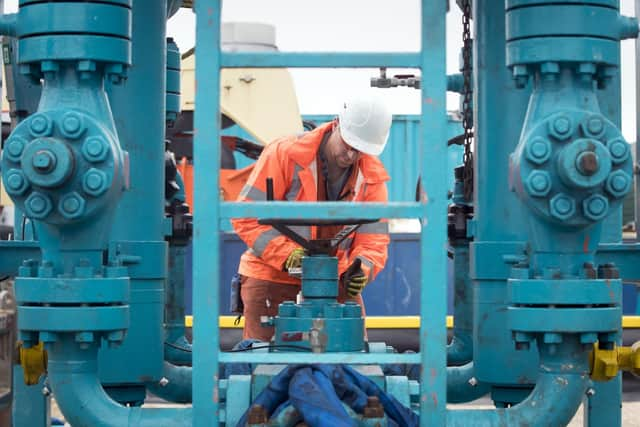Opposing fracking in Yorkshire isn't extremism - it is common sense: Simon Sweeney
The idea has provoked a considerable backlash, albeit not from every quarter.
On the pages of The Yorkshire Post recently, Charles McAllister, the director of policy, government and public affairs at United Kingdom Onshore Oil and Gas (UKOOG) organisation, argued that a rethink was needed and fracking would actually be a positive for Yorkshire as well as the rest of the United Kingdom.
But I believe he is wrong.


Global warming threatens a sixth mass extinction.
A mass extinction destroys 75 percent of life on earth.
Advertisement
Hide AdAdvertisement
Hide AdThe cause is usually volcanic eruption, although the most recent was due to an asteroid impact that destroyed all non-avian dinosaurs 65 million years ago.
The sixth mass extinction is probably already happening, but it is not too late to prevent its most devastating impact.
The critical difference between this potential mass extinction and previous ones is that this one is caused by human activity, primarily – but not exclusively - industrial and post-industrial burning of fossil fuels.
Worldwide agreement to cut carbon emissions and switch to cheaper, readily available renewable alternatives would address the threat.
Advertisement
Hide AdAdvertisement
Hide AdAt COP21 in Paris in 2015 the world’s leading economies, the chief emitters of the largest proportion of greenhouse gases (GHGs), agreed to limit global warming to 1.5 degrees Celsius above pre-industrial levels.
This target is achievable if governments, including our own, commit to cutting energy consumption, insulating homes and workplaces, and complete the transition to renewable energy as soon as possible.
There is no logic in using oil and gas as bridging fuels in the transition to renewable energy as the Government is currently planning.
Exploiting more fossil fuels, whether in the Bowland Shale or the North Sea, will exacerbate the crisis.
Advertisement
Hide AdAdvertisement
Hide AdStopping oil and gas exploitation would hit the record profits enjoyed by McAllister’s industry, an industry that in 2020 invested only about one percent of its total capital expenditure in clean energy alternatives, according to the International Energy Agency.
I do not expect Jacob Rees Mogg, who smears anti-fracking campaigns with inaccurate claims about who finances them, or Mr McAllister to pay much attention to me.
But it is a shame, and shameful, that they ignore science.
They should listen to Michael Greshko from the National Geographic: “Sudden climate change can be profoundly disruptive. And while we haven’t yet crossed the 75 per cent threshold of a mass extinction, that doesn’t mean things are fine.
"Well before hitting that grim marker, the damage would throw the ecosystems we call home into chaos, jeopardising species around the world—including us.”
This is already happening.
Advertisement
Hide AdAdvertisement
Hide AdMost who oppose fracking are ordinary people with no history of protesting about anything until McAllister’s industry came looking for opportunities to frack.
Those who protest are worried about climate change, contamination of drinking water, unsustainable demand for scarce water supplies, 24/7 HGV movements in rural areas, methane (shale gas) escapes (methane is a GHG ten times worse than CO2), reported health risks, and the industrialisation of the rural landscapes of Yorkshire and Lancashire.
But anti-fracking campaigns oppose fracking everywhere. This is not NIMBYism.
Fracking is not a quick win.
Even the industry knows it would take several years to extract shale gas in any considerable volume.
Advertisement
Hide AdAdvertisement
Hide AdNor is shale gas in Britain a huge untapped resource as McAllister claims.
The British Geological Survey and the University of Nottingham reported in 2019 that previous estimates of shale gas reserves were massively overstated.
A study by Durham and Newcastle universities estimated only very low levels of recoverable gas from the Bowland Shale given the surface requirements and infrastructure impact.
McAllister surely knows that fracked gas would be sold at world prices so there would be no cheaper bills for UK consumers.
Advertisement
Hide AdAdvertisement
Hide AdLord Browne, a former CEO of BP, admitted UK fracking would have no material impact on prices.
Maybe McAllister’s industry might buy some shirts for local sports teams, or sponsor a cricket pavilion, but there will be no reduction in gas bills.
There will be no savings in carbon emissions either.
Any gas that the UK does not import, or that Ineos plc does not source from the United States for its plastics plant at Grangemouth, will be sold elsewhere and still burned.
All UK fracking would do is add to the global total of carbon emissions.
Simon Sweeney lectures on International Political Economy at the University of York.